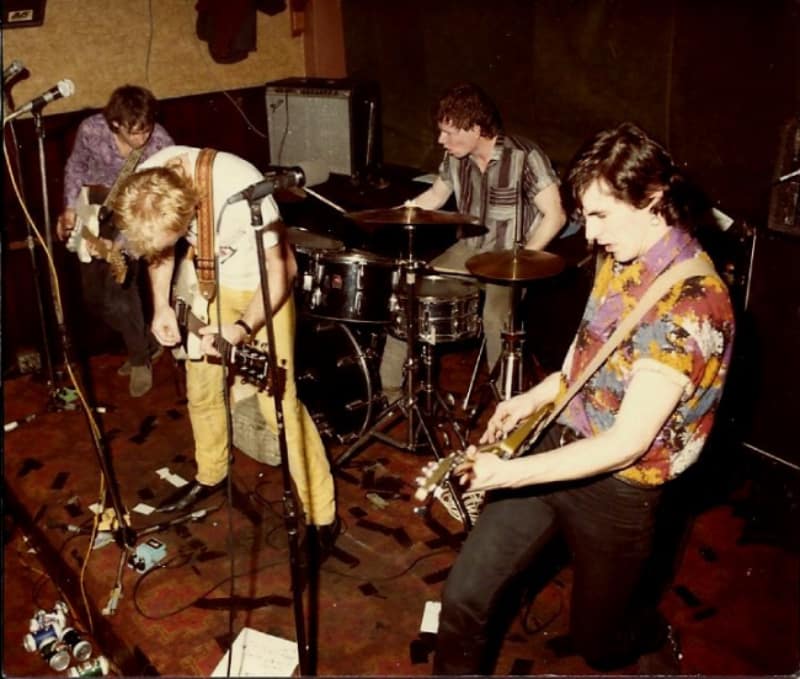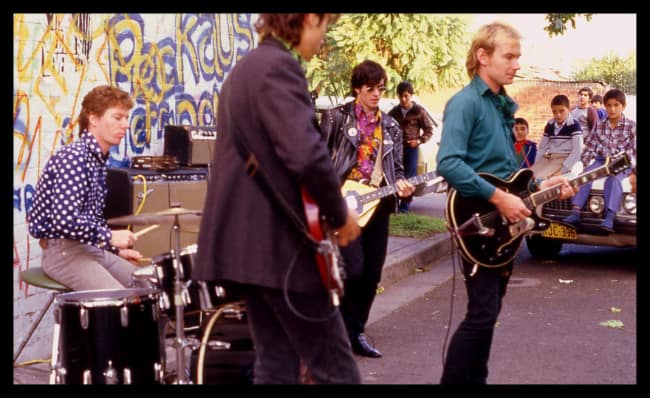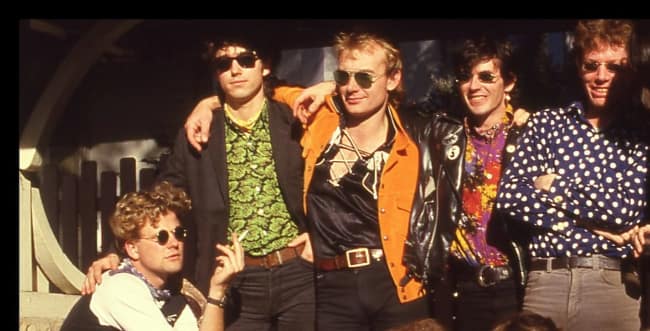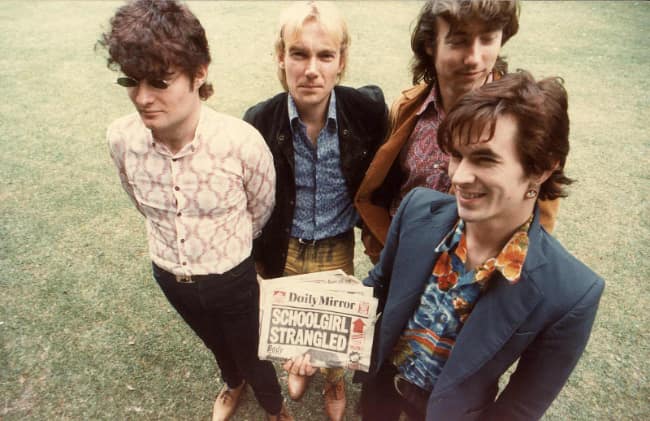 Jon Schofield leading The Grooveyard through a set with (fron left to right) Ian Little, Richard Lawson and Bob Wackley.
Jon Schofield leading The Grooveyard through a set with (fron left to right) Ian Little, Richard Lawson and Bob Wackley.
A little piece of Australian underground rock and roll history was rescued from relative obscurity in April when the modestly-proportioned back catalogue (one 45 and an EP) of 1980s Sydney band The Grooveyard was re-issued digitally.
Grooveyard played ‘60s-influenced power pop in and around Sydney in the 1980s. Their recorded legacy kicked off with their Chris Masuak-produced “Avalanche of Love” single in 1984 and ending with the posthumous 12-inch “Grooveyard" EP in 1989.
The Grooveyard was something of a supergroup. At various times, its ranks included future Paul Kelly and Messengers, Chinless Elite and Hell To Pay member Jon Schofield, Lime Spiders drummer Richard Lawson, ex-Razar member and future Screaming Tribesmen Bob Wackley, Geoff Rhoe (ex-Minuteman), Ian Little (Bambalams) and Sean Maguire (ex-Minuteman).
Chris Virtue of Sydney’s 2RRR-FM “Virtual Unreality” program, caught up with guitarist and vocalist Jon Schofield recently to ask him about Grooveyard’s exhumed recordings, his own storied career and rumours of live shows by his former band. Here’s the edited conversation.
Jon Schofield, welcome.
Thank you. It's a pleasure to be here.
I've been listening to these Grooveyard tracks and they still sound really fresh and jangly. Geez they're good songs. Tell us a bit about Groovyard because I know you from the Coloured Girls, you were the bass player in that, and of course Paul Kelly was the songwriter. I believe you wrote these Grooveyard songs.
I did write all the ones that ended up... oh no, except for the B side of “Avalanche of Love”, which is a corker, and that was written by our bass player, Rob Wackley, who changed his name to Robert Hood. And then moved to America and never came back. He was in the Screaming Tribesmen for a while, after Grooveyard. But, yeah, I'm responsible for the rest of them, I'm afraid.
Tell us a bit about Grooveyard. Are you planning some sort of proper release of them?
Well, no, which is why Richard Lawson (one of The Grooveyard’s drummers), who organized this interview and is a force to be reckoned with, has had them released online. Because you can't get the vinyl anymore, and we never got around to putting out a CD because we were all doing other stuff by that stage. A compilation CD would probably have been a great idea, but we're all moved on, you know what I mean? So all the vinyl has either been snapped up or sold or worn out, as far as I can tell.
And so when Richard said, ‘I really want to put The Grooveyard’s songs up on Spotify, Bandcamp, whatever’, I didn't argue, put it that way. So that's what's happened.
Of course also he managed to dig up that film clip of “Avalanche of Love” as well and I've got to say it's pretty funny and pretty good, actually. I think it's a really well made clip. It's a great effort by a lovely bloke I've known forever, Larry McGrath, who's very talented with any kind of camera in his hands, you know. I've got to say, he's got fabulous taste and he did it for next to nothing, which is the way we did everything back then of course.
So when I saw it again for the first time in 40 years, I must say it was hilarious! It came back to me that we had so much fun making it, and we had we just had so much fun doing everything back then in Sydney in the mid ‘80s if you know what I mean.
Well I was I was in Melbourne at the time.
Are you okay now?
Yes, I moved to Sydney in about 1990 and yes, I'm never going back to Melbourne to live. Bugger that! I have to put in my bit for Sydney whenever I can these days because, you know, Melbourne you know has taken over with live music, let's face it.

One of the things I found that was interesting about Grooveyard in the credits of “Avalanche of Love” is that Chris Masuak produced it. I'd never really come across him as a producer before.
Obviously other members of Radio Birdman have produced. Rob Younger's produced all sorts of stuff and I'm sure Tek’s had his finger in a few pies. But Masuak just put his hand up, and we didn't have a budget. We didn't have any idea. It was the first record I ever made. And I think it was the same for everybody else in the band. Of any description.
First time we went into a recording studio and recorded something. So to have someone like Chris Masuak lend me his guitar for a start… and show me how to pull the strings so they don't stretch halfway through a recording. We learned a lot very quickly. So he did a great job at Emerald Studios, up on the North Shore. And it took no time at all and it was so much fun. And Masuak was great, I've got to say. He did really well.
He said, ‘You don't need to be quick here’. He mic'd up my guitar through a tiny little amp and put a microphone about six inches away from it. And you could hardly hear the thing. And he said, ‘You wait till this comes back on tape’ (I’m trying to do that with a Canadian accent.) ‘You wait man. Until this comes baaack’.
And I went, ‘Yes whatever’.
And it came back and it sounded bigger than Ben Hur.
And I went. ‘Well that's interesting’.
And the end result was that it sounds pretty good, I reckon. And the B side “I Told You So” is great as well. “Avalanche of Love” was totally a really nice juxtaposition to the other song.
OK, now about you, because when did you end up joining Paul Kelly and the Coloured Girls?
I'd actually already joined by the time we did that Grooveyard EP. It was weird because we recorded the EP and then I up as a Coloured Girl... before we actually got around to finishing or mixing the EP properly. And then of course I didn't have time to scratch myself because the “Gossip” LP came out and everything kinda went mad.
We were just touring like mad and then I got back to Sydney for a little while. And we somehow managed to get together the remnants of The Grooveyard to finish it off and exit.
But it was done in such a rush that there's a couple of things I really want to clear up quickly.
Not very important but the song “Days of the Week” is supposed to be spelt “Daze of the Weak” but we didn’t have time to change it. More importantly, the lead guitar on “Messin' Distress” is actually Steve Connolly from The Coloured Girls. Because I think when we were recording, we just ran out of money or time or whatever, and Ian Little, who's a sensational guitarist, just didn't have time to do it.
So by the time we all got back together, we only had time to basically quickly finish it off, mix it and try and flog it to a record company (which was Waterfront) and see what they wanted to do with it. But of course the band no longer existed so you can understand how well that went.
I mean like Mr Kelly would have given you a stable job. You would have toured relentlessly with him.
Yeah. It was what, I guess. all musicians were dreaming about and it was looking like it was coming true. But to his credit Paul said, ‘Go and finish it, if you're halfway through, doing something like that, you've got to finish it off. Don't worry, do it’. And so we found time, and Steve was gracious enough to come in and drop in the solo that we never got around to putting on. That worked well and we got a couple harmonies down and whacked it out.
But the band didn’t exist anymore and Waterfront, quite rightly, just sort of dropped it like a bloody rotten egg, So it's interesting to hear it again Because I have real trouble listening to anything that I've actually recorded again. You know?
And it's not because I don't think it's good, it's just a bit weird and there's all this other great stuff out there that you have to try and find time to listen to. I'm sure you understand what I'm talking about as a radio presenter.

Exactly. I have the same problem. If I pre-record a show. I’ll listen to it when it goes to it just to make sure the right program is going to air and then I don't want to listen to it any more.
Having listened to Grooveyard’s recordings for the first time in 40 years, pretty much…, it sounds great. It sounds OK. I don’t brag about it.
I think it's a nice piece of power pop. I really do. It's got those those lovely jangly guitars that just…it's a thing not only of its time.
It's strange,. I had a bit of a conundrum because, I'd left Adelaide and I was a big punk fan. Ramones and Pistols. But I also loved the ‘60s jingle jangle Byrds stuff. Everyone in the band, was basically the same.
We got together and said, ‘So what are we going to do?” And I said, ‘I don't know,’. What happened was songs came out of my head and Ian's and Bob Wackley's ideas that were kind of like the Byrds meet the Ramones. We were young enough to get away with it,. We had the Paisley shirts and the winklepickers and, you know, (we were) not a bad looking bunch of blokes.
We didn't really know what we were doing, but we learned and we had fun finding out, you know what I mean?
Yeah, and I mean, on the thing of the, you know, the Byrds meets the Ramones or the vice versa. Is it, it's not- It's not such a silly sounding thing, in that the Ramones were very influenced by early ‘60s pop. Well yeah. All sorts of it, including the Byrds.
Yes, yes I know. I mean, if you're mad enough or bored enough to go online too often, like you know, on your phone waiting for something to happen in your normal life, and some of the things you find out about those days are hilarious. Stuff about the punk bands and their influences. John Lydon, you know, Google him and you get quite surprised if you know what I mean.
Getting back to Grooveyard, obviously you're writing songs and of course Paul Kelly wrote the songs in his bands. Do you have any regrets as sort of thinking, well, I could have been a serious...
No. No. For the same reason that I don't really ever put my music on and listen to it. It’s the same reason I don't have any regrets because that was then and this is now and... tomorrow is tomorrow and you've got to…You know, one of the best three words Bob Dylan ever strung together was ‘Don't look back’. And when people do start looking back, it obviously hasn't worked at the moment. Because that's what we're doing, looking back.
Yeah, but I think. I think that it's okay.
I'm not complaining.
Don't complain. Exactly. And when you do look back you sort of we get to an age where we start to realize that okay we are because of all these things. That's who we are now. Yeah. So I think I think it's cool.
It's probably okay to look back but don't put your glasses on.
God if I just take off my glasses…Jeez. I can't see a friggin thing.
Don't worry we're all wearing them, I think.
Now how long were you with Paul Kelly for?
Let's see, end of ‘85 to early ‘92.
Right, because in that time the band had been renamed The Messengers.
Yeah because when we went to America...And that's the death knell, you know, really is. I'm sorry, but you know how never rename your ship? Yeah. Yeah, because it'll sink.
Yep.
Big record company, A&M. And they had a guy who was really hot for us, loved us, and he got snapped up by another record company. And the wheels sort of, fell off.
But the worst thing was having to change the name to The Messengers because we were The Coloured Girls, for God's sake. It's from the Lou Reed song. But when we got over there, they said, ‘Look, okay, we'll give you 250,000 American dollars - we're talking back in the late ‘80s - to make a record. But you cannot be The Coloured Girls because you're going to have to go out and tour across America’.
‘Oh, do we really have to? Oh dear’.
You know, of course we're very excited, but I said, but you'll get away with being the Coloured Girls on the East Coast and the West Coast, but you will not get away with it in the middle. ‘Cause it's like, it's another country.
And not in the South.
Yeah. I don't know if you've been there.
I have. I have. And you know, I've, I've driven a car across America and it's full of amazing people but I could imagine it going down like a bloody lead balloon in the south as well.
Well, yeah, we’d just get our heads punched in. Quite rightly.
So why couldn't you have been The Messengers in America and The Coloured Girls in the rest of the world?
You can go and get “Gossip” and “Under The Sun’ - well, at least “Under The Sun and everything after that is either The Coloured Girls or The Messengers depending on where it was released. But I mean, the worst thing was just having to change the name. And the other thing was we'd already recorded “Under the Sun” in Australia and it was kicking goals and we'd toured it and we'd played all those songs and we were ready to go on and do something new. And then we had to cut back and sort of do those songs all over again.
And I know it sounds like I'm whinging but it was a bit weird because of having to start again, if you know what I mean.
Yeah, yeah, I do I totally get it.
Don't get me wrong. We had the best fun and met great people and we got great responses. And we got to go around America twice and make a film for over there and all this stuff, and we learned a lot. But it was a bit weird when you have to do what you've just done - again.
Like you've never haven't done it before and haven't toured it before. And change your name at the same time? It’s a bit like whinging about something that was fantastic - and I don't want to.
 Grooveyard staying abreast of current affairs.
Grooveyard staying abreast of current affairs.
No I totally get it. So what happened after, for you, after the Coloured Girls/Messengers?
Came back to Sydney and then Steve Connelly and I had a little band called the Bum Steers which was great fun, which was just country. Jeez, that was great. And then eventually a friend of mine, Jim Bowman, who used to play with Ed Kuepper, sort of hunted me down and said, ‘We should put a band together’.
And I didn't really know him very well and I thought I'm not very good at throwing bands together. Other people tend to do it for me. And we formed a band called The Stepfords and we were able to release our artistic instincts through that for a while which was fun.
The Stepfords were pretty good actually. Well we had Clyde Bramley on bass, for a start.
Oh okay, Clyde's a mate, he's been on the show many times.
Yeah, yeah and we had Iain Shedden. from The Saints on the drums. We had the rhythm section from Heaven and the drop dead gorgeous, beautiful woman, Monica McMahon with her great voice, singing. So we did that for a while and we put out a CD, and it's pretty cool.
I've done stuff lately which has been rewarding because I'm in the country now and I've got a studio.
Oh, okay.
So, yeah, I can sort of relieve the pressure cooker without having to travel, which is great. You know, because I'm 69 for God's sake, so I don't really want to go hauling amplifiers around, unless I really have to.
Yeah, fair enough. Yeah.
The other thing I keep forgetting about is I was in a sensational musical conglomeration called Vienna World with Murray Patterson, who's played with Tex Perkins and... He's up in northern New South Wales and is a huge talent. The most beautiful guitar player. Well, one of the most beautiful, that I've ever had the pleasure of being a band with. And with Justine Clark,, the star of stage and screen. And that was a great band. It was fantastic. Playing mainly their songs, one of mine. was sensational. I mean, Google it. Google it, mate.
Okay well I'll Google it. So let's do get back to Grooveyard, which I do recommend people check out. It's just going to be a digital release?
Well yeah …I don't know. Richard Lawson is the driving force behind us. So I guess I've been talking about (it) a bit with a few people lately, because I live in country New South Wales in the small town of Binalong and nobody here knows about it. Because it's not the sort of thing you bring up in a country pub.
It's funny you should ask because I sold my Epiphone C, a hollow body electric guitar that I used in The Grooveyard, to a young kid down the road from here. And don't know, it's really his kind of guitar. So I borrowed it back, just out of interest. out of nostalgia, and plugged it into my Vox AC-15 amplifier – the one that I never had when I was in The Grooveyard - and my God, it just sounds beautiful, do you know what I mean?
Do you have any urge to get out and play?
Any what?
Urge to get out and play in front of an audience.
Yeah, sorry, yeah. It's starting to come back - like a nasty rash. No, no. I don't want to say anything about that really because that's the best way to make sure it doesn't happen. But I mean, between Lawson, me and Ian Little and... I think I've found a bass player who lives down the road…for a start we could bring the average age of the band down to something respectable, and maybe do some shows.
Maybe one in Melbourne, one in Sydney, one in Canberra or something like that. That was Richard’s idea and I was thinking he was out of his mind, but that was a couple of weeks ago .
I’d come down and see you in Canberra .
You know, it's not the most stupid idea in the world.
No I don't think it is either. Just on this… you were a guitar player in Grooveyard and you're the bass player in The Coloured Girls. So how did that come about?
Oh it's a hilarious story. It's fantastic. How long have you got? It involves Jeremy Oxley from the Sunnyboys.
After Grooveyard finished, or at the same time, he couldn't do the Sunnyboys thing anymore because of his mental health issues. But he still wanted to play music. And of course he had enough money to do whatever the hell he wanted already by that stage, I guess. But even if he hadn't, he was still gonna do it, I could tell. And I was a huge Sunnyboys fan and friends with all the band. I was a Sunnyboys tragic.
Anyway, he rang me and said, ‘I want to throw a band together. Pretty much a covers band like soul blues stuff. Do you want to be in it?’ And you can imagine how long it took me to say, ‘Yes’. Like, two milliseconds.
And he said: ‘OK, I'm living over in Newtown and why don't you just come over and we'll see what happens’.
And I'm just going, ‘My God, I can't believe this is happening. This is fantastic’. So I raced over there with my six-string guitar.
He said, ‘No, I've got an amp, don't worry about an amp, I've got everything’. And I went, ‘Oh right’. I couldn't believe it was happening. And I went over there and then about five minutes after I got there, Marcus Phelan, who's a far better guitarist than I am, he's also there. I just went, um, so hang on, what have we got? Because Jeremy obviously was going to play guitar so we've got three guitarists. Who's the bass player? And Jeremy looked at me. I don't know whether he was confused or whether subconsciously he knew… and I went, ‘OK, well that's all well and good, but I don't have a bass guitar’.
And Marcus sort of read the play brilliantly and said, ‘I've got one I've got a Hofner bass, an imitation Paul McCartney bass. Five minutes away. I'll go and get it’.
And I'm sitting there going, ‘Just be quiet, be very quiet for a long time, Jon, and see what happens’.
And he came back and plugged it in. And I played it and went, ‘Whoa, this is kind of fun’.
Meantime Oxley's going, ‘I've got a residency booked up at the Seaview Hotel in Townsville, it's winter, we're going, because it's beautiful up there and everything's, I've got the money, we've got two Taragos and a residency booked, are you in?’
And I went, ‘Yes’. That's how I became a bass player.
Wow. Look, we need to wind it up. It's been an absolute pleasure and when you're in Sydney hit me up and we'll get you in the studio and we'll talk shit and play records.
Oh that sounds great. That sounds really good man.
Thanks Jon Schofield, it's been an absolute pleasure.

